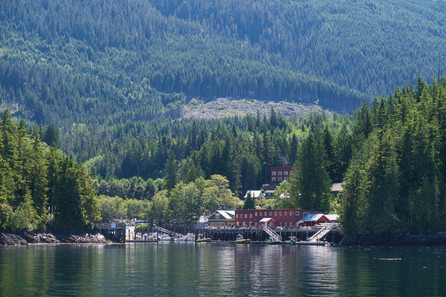Whales on Vancouver Island
- Alison Udall

- Sep 1, 2022
- 3 min read
Updated: Feb 22, 2023
Our second full day in Telegraph Cove we went back out on the water to do a three hour tour with Prince of Wales. This time on their bigger boat. The fog was really heavy when we first arrived to check in so they delayed our start about 45 minutes to give it a little more time to clear out. What this area is really known for is it's whales and especially Orcas (which are in the category of toothed whales and the largest member of the dolphin family) as well as Humpbacks.

We were surprised to learn, as the tour went on, that they live pretty well together in this particular area (they are an apex predator and normally the main natural predator of Humpbacks)! We learned that here the Orcas don't hunt seals/whales much as 80% of their diet consists of one type of fish, Chinook salmon, which are the largest species of Pacific salmon. Because they don't hunt other mammals the naturalist explained these resident pods are much more vocal since they don't have to be silent hunters. It was interesting to find out that pods in different regions have very different diets (the ones further south by Victoria still hunt mammals).
It didn't take us long for the naturalist to spot a pod of Orcas bobbing slowly together really hidden in the dense fog. They looked so graceful just slowly rising/lowering back into the water. She explained this was a resident pod (it was amazing how quickly she could identify which ones we were seeing by the shape of their fins). They travel together tightly when they rest/sleep and the pod is comprised of multiple generations. The really tall straighter fins are the adult males. We were able to hear some of their clicking noises when they lowered a microphone into the water to listen for them.
Cool facts I learned afterward regarding this:
"Orcas sleep in a very different way to humans. We have a breathing reflex and when we sleep or become unconscious, we continue to breath automatically. Orcas cannot sleep in this way, they have to remain conscious, even when they are sleeping! This is because their breathing is not automatic - they have to actively decide when to breath, and so they must be conscious even when sleeping. If like us, orcas went into a deep unconscious sleep, they would stop breathing and suffocate or drown.
To get around this, orcas only allow one half of their brains to sleep at a time; the other half stays alert enabling them to continue breathing whilst looking out for dangers in the environment. They only close one eye when they sleep; the left eye will be closed when the right half of the brain sleeps, and vice versa. This type of sleep is known as unihemispheric sleep as only one brain hemisphere sleeps at a time. Orcas periodically alternate which side is sleeping so that they can get the rest they need without ever losing consciousness. When sleeping, orcas swim very slowly and steadily, close to the surface."
Our captain maneuvered the boat around so we could follow them for a bit until we lost them in the fog and continued on. Every now and then we'd spot them again. As the morning went on the fog began to lift and our ability to see them just kept getting better and better. They identified a second pod also moving around us.
Here's a compilation of video clips that Jordan put together of some of the activity we got to watch. It was amazing to see this many Orcas of varying ages (notice the much smaller fins swimming with the adults).
Then we headed off to find some Humpback Whales which were also swimming around this same area. We spotted one and started following it. They have a very unique body shape with a small dorsal fin.
We learned they feed on small fish and it didn't take long to notice lots of bird activity up ahead (around a bait ball of fish) that our whale was heading towards. We began following it and our naturalist started to explain that typically they will jump up (mouth first) inside a bait ball gulping up fish. No sooner had she finished explaining this when THIS HAPPENED!
THAT MOUTH!!!!! It was truly spectacular to see the size of it! She said it would probably do it again and sure enough this time Jordan was filming. There was a mom/calf and then another large male Humpback came in to feed as well. Here's the video compilation of the activity we watched.
It was just the most incredible day of activity and exceeded all our expectations. Stunning scenery and stunning wildlife.
Watching the final sunset from our little cottage that night we felt pretty damn lucky to have experienced such an amazing part of Vancouver Island.
August 2022














































Loved this!!! Spying on Whales by Nick Pyenson might be. A read you would enjoy. I loved it. Non-fiction. On Audible or in print.